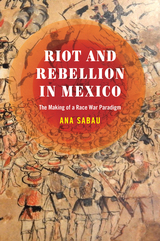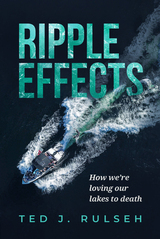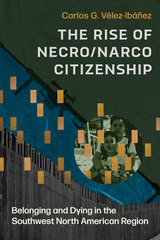3 books about Wolfe, Charles R.
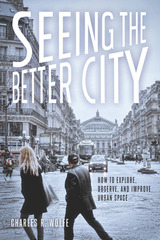
Seeing the Better City
How to Explore, Observe, and Improve Urban Space
Charles R. Wolfe
Island Press, 2016
Finalist for a 2018 United Kingdom National Urban Design Award • A 2017 KUOW Public Radio 2017 End-of-Year Book Choice
In order to understand and improve cities today, personal observation remains as important as ever. While big data, digital mapping, and simulated cityscapes are valuable tools for understanding urban space, using them without on-the-ground, human impressions risks creating places that do not reflect authentic local context. Seeing the Better City brings our attention back to the real world right in front of us, focusing it once more on the sights, sounds, and experiences of place in order to craft policies, plans, and regulations to shape better urban environments.
Through clear prose and vibrant photographs, Charles Wolfe shows those who experience cities how they might catalog the influences of urban form, neighborhood dynamics, public transportation, and myriad other basic city elements that impact their daily lives. He then shares insights into how they can use those observations to contribute to better planning and design decisions. Wolfe calls this the “urban diary” approach, and highlights how the perspective of the observer is key to understanding the dynamics of urban space. He concludes by offering contemporary examples and guidance on how to use carefully recorded and organized observations as a tool to create change in urban planning conversations and practice.
From city-dwellers to elected officials involved in local planning and design issues, this book is an invaluable tool for constructive, creative discourse about improving urban space.
In order to understand and improve cities today, personal observation remains as important as ever. While big data, digital mapping, and simulated cityscapes are valuable tools for understanding urban space, using them without on-the-ground, human impressions risks creating places that do not reflect authentic local context. Seeing the Better City brings our attention back to the real world right in front of us, focusing it once more on the sights, sounds, and experiences of place in order to craft policies, plans, and regulations to shape better urban environments.
Through clear prose and vibrant photographs, Charles Wolfe shows those who experience cities how they might catalog the influences of urban form, neighborhood dynamics, public transportation, and myriad other basic city elements that impact their daily lives. He then shares insights into how they can use those observations to contribute to better planning and design decisions. Wolfe calls this the “urban diary” approach, and highlights how the perspective of the observer is key to understanding the dynamics of urban space. He concludes by offering contemporary examples and guidance on how to use carefully recorded and organized observations as a tool to create change in urban planning conversations and practice.
From city-dwellers to elected officials involved in local planning and design issues, this book is an invaluable tool for constructive, creative discourse about improving urban space.
[more]
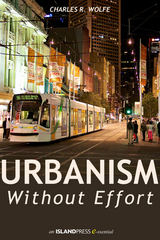
Urbanism Without Effort
Charles R. Wolfe
Island Press, 2013
**Revised editions (paperback and e-book) to be released at beginning of 2019; available for preorder now on separate product page.
This product is part of the Island Press E-ssentials Series and is not the most current edition.**
This product is part of the Island Press E-ssentials Series and is not the most current edition.**
This beautifully illustrated short e-book explores the idea that to create vibrant, sustainable urban areas for the long term, we must first understand what happens naturally when people congregate in cities—innate, unprompted interactions of urban dwellers with each other and their surrounding urban and physical environment. Wolfe elaborates on the perspective that the underlying rationales for urban policy, planning and regulation are best understood from a historical perspective and in a better understanding of the everyday uses of urban space. To make his case, Wolfe draws on his years of writing about urbanism as well as his professional experiences as a land use and environmental lawyer and offers compelling case study vignettes from everyday urban life.
Successful community, Wolfe argues, is among the first principles of what makes humans feel happy, and therefore city dwellers invariably celebrate environments where and when they can coexist safely, in a mutually supportive way. Wolfe believes such celebration is most interesting when it occurs spontaneously—seemingly without effort. He contends it is critical to first isolate these spontaneous and latent examples of successful urban land use, before applying any prescriptive government policies or initiatives. Wolfe provides something rare in contemporary urbanist writing—rich illustrations and examples from real life—both historical and current. His writing about the past and the future of urban form offers readers inspiration, historical context, and a better understanding of how a sustainable, inviting urban environment is created.
[more]
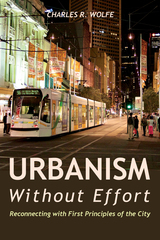
Urbanism Without Effort
Reconnecting with First Principles of the City
Charles R. Wolfe
Island Press, 2018
How do you create inviting and authentic urban environments where people feel at home? Countless community engagement workshops, studies by consulting firms, and downtown revitalization campaigns have attempted to answer this age-old question. In Urbanism Without Effort, Chuck Wolfe argues that “unplanned” places can often teach us more about great placemaking than planned ones.
From impromptu movie nights in a Seattle alley to the adapted reuse of Diocletian’s Palace in Split, Croatia, Wolfe searches for the “first principles” of what makes humans feel happy and safe amid the hustle and bustle of urban life. He highlights the common elements of cities around the world that spontaneously bring people together: being inherently walkable, factors that contribute to safety at night, the importance of intersections and corners, and more. In this age of skyrocketing metropolitan growth, he argues, looking to the past might be our best approach to creating the urban future we dream about.
A whirlwind global tour, Urbanism Without Effort offers readers inspiration, historical context, and a better understanding of how an inviting urban environment is created.
From impromptu movie nights in a Seattle alley to the adapted reuse of Diocletian’s Palace in Split, Croatia, Wolfe searches for the “first principles” of what makes humans feel happy and safe amid the hustle and bustle of urban life. He highlights the common elements of cities around the world that spontaneously bring people together: being inherently walkable, factors that contribute to safety at night, the importance of intersections and corners, and more. In this age of skyrocketing metropolitan growth, he argues, looking to the past might be our best approach to creating the urban future we dream about.
A whirlwind global tour, Urbanism Without Effort offers readers inspiration, historical context, and a better understanding of how an inviting urban environment is created.
[more]
READERS
Browse our collection.
PUBLISHERS
See BiblioVault's publisher services.
STUDENT SERVICES
Files for college accessibility offices.
UChicago Accessibility Resources
home | accessibility | search | about | contact us
BiblioVault ® 2001 - 2025
The University of Chicago Press




